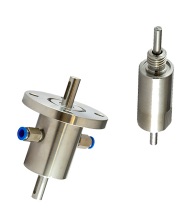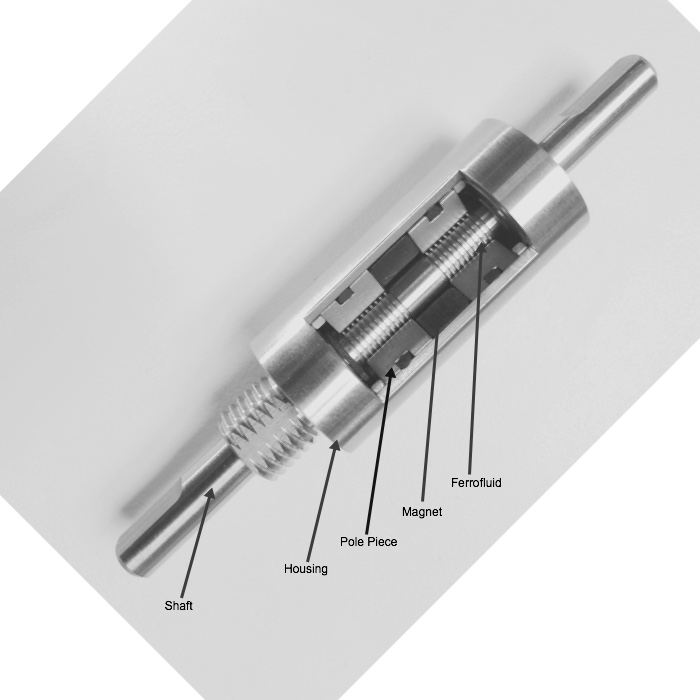
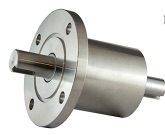
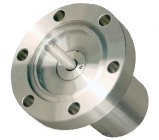

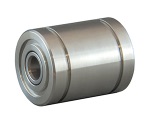
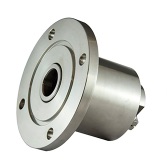
Hermetic High Vacuum Seal
A Ferrofluid seal provides a hermetic atmospheric to high vacuum rotary vacuum seal under both static and dynamic conditions against gas, vapor and other contaminants. Leakage rate specification of each ferrofluid seal is 1 x 10‐9 std. cc/sec. All ferrofluid vacuum seals are leak checked with a helium leak detector. Rotary seals with ConFlat (CF) flanges are designed as a UHV rotary feedthrough.
Longevity
In the ferrofluid rotary vacuum seal feedthrough, the seal is formed with the ferrofluid, transmitting minimal to no friction. There are also no wear parts that can break off and contaminate the vacuum system. The ferrofluid itself is inert, stable and with low vapor pressure. The lifetime of the seal is dependent on the application, but a 10+ year time maintenance time frame is not unexpected.
Strong Reliability
The Ferrofluid seal contains a simple, permanent magnetic circuit and low volatility ferrofluid. The only wear parts are self-contained ball bearings. These ball bearings are designed for a robust, high speed transmission and long lifetime.
Non-Contaminating
Unlike o-ring vacuum seals, there is a lack of mechanical friction in the seal. No particles are produced which could contaminate the vacuum system. Low vapor pressure ferrofluids maintain seal integrity even in high vacuums better than 10-9 mbar (ultra-high vacuum systems).
High Speed Capability
Ferrofluid seals provide hermetic vacuum sealing at high rotational speeds (>10,000 rpm) with smooth motion.
No Leakage
Ferrofluid seals provide leak-free performance, even in intermittent and static rotating conditions. Elastomeric (or o-ring type seals) seals can be susceptible to plasticizing and relaxation effects during idle periods.
Cross Reference Chart to Other Brands
Rotary Seal Vacuum Feedthrough Standard Specification:
Leak rate: 1 x 10‐9 std. cc/sec, He
Vacuum range: 8 x 10‐7 Torr
Max. operation pressure: 28 psi
Bearing lubrication: Fomblin / Krytox
Specification for CF flange
Leak rate: 1x10‐11 std cc/sec, He Vacuum range: 5x10‐10 Torr
Standard ferrofluid
Base oil: Hydrocarbon
Max. operation temperature: 0‐80 °C
Reactive gas ferrofluid
Base oil: Perfluorinated Polyether
Principles of Operation-Ferrofluid Vacuum Feedthrough
A ferrofluid style rotary seal vacuum feedthrough uses the response of a magnetic fluid with an applied magnetic field. Rotary seal components include a ferrofluid, permanent magnet, two pole pieces and a magnetically permeable shaft. The magnetic circuit employs stationary pole pieces and the rotating shaft to concentrate the magnetic flux in the radial gap under each pole piece. When the ferrofluid is applied to this radial gap, it takes the shape of a liquid O-ring and produces a hermetic vacuum seal. Ferrofluidic vacuum rotary seal feedthroughs use fabricated multiple rings or grooves with ferrofluid locating in stages formed by grooves machined into either the shaft or pole pieces. Typically each single stage or groove can sustain a pressure differential of 0.2 atmospheres (200 mbar). The total vacuum pressure achieved is the sum of all the differential pressures provided by the grooves.




